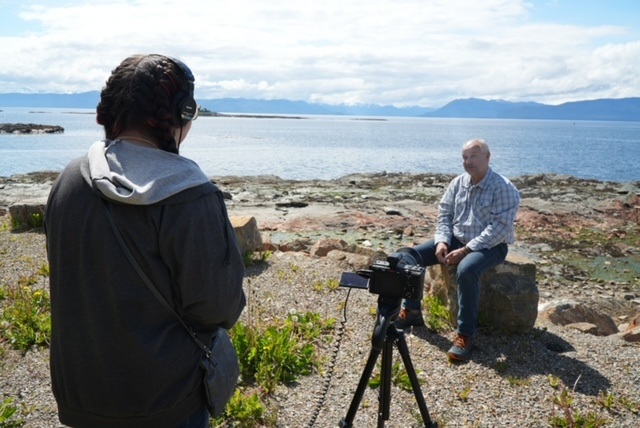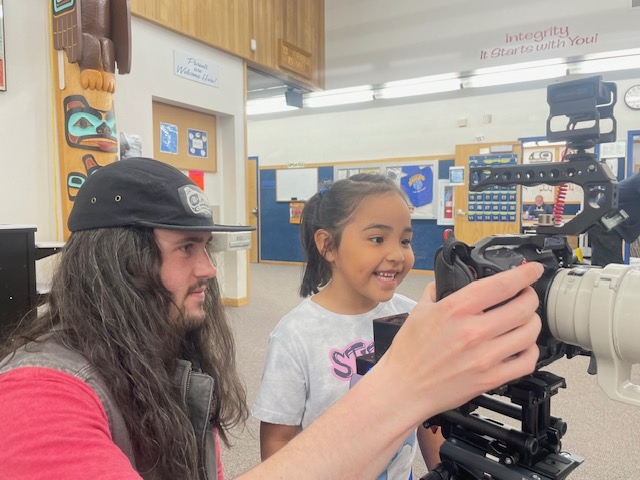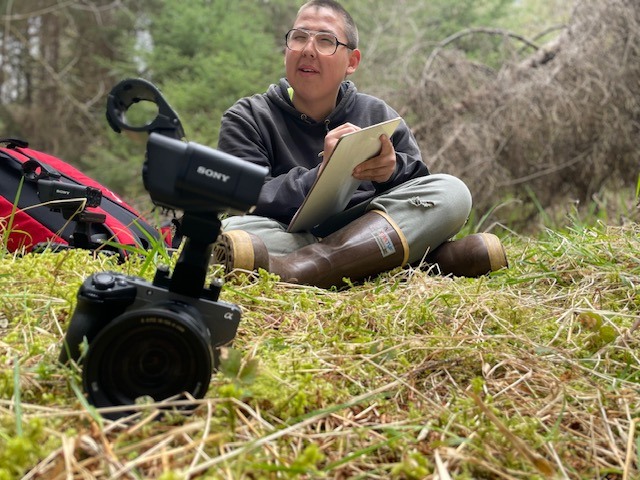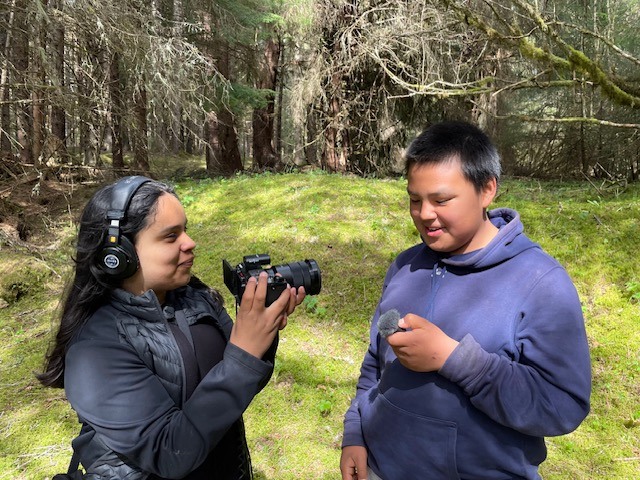
See Stories student at work filming an interview in Angoon. Marie Acemah
Amanda Dale • October 12, 2024
This month, we’ll share in-depth profiles of the three winners of the 2024 Governor’s Awards in the Humanities. First up is See Stories, winner of the Education Award in recognition of its work strengthening communities by contributing to a better understanding of the world, one another, and the human experience. To learn more about See Stories, we talked with founder and director Marie Acemah and Roben Itchoak, an Iñupiaq teacher in Shishmaref who joined a See Stories steering committee after experiencing its Anchored Histories course.
As a teen in Anchorage, Marie Acemah struggled to find her own voice. “I had a lot to say but I really struggled to express it,” she remembers. “It was just an awkward, hard time in my life. I had a teacher, Lydia Ossorgin at Atheneum School, who asked me once during an interview, “What are you studying in math class?” And I thought about it for a second and said, “I have no idea.” I expected her to totally reject me for being a bad student, and instead she loved how genuine I was that I didn’t try to come up with a quick answer. And in that moment, a grown-up made me feel totally OK just as I am. And it changed my life. That experience made me want to offer the same as an adult to the next generation, whoever they might be.”
In 2014, that vision came to life in Acemah’s nonprofit organization See Stories, which works to create this validation for young people through programming with students and educators. At the core of See Stories is the belief that representation matters, and that Alaskan youth are uniquely equipped to share authentic local histories through filmmaking and podcasting. In student workshops, teens throughout the state tell their own stories by choosing topics they are passionate about, interviewing peers, family and community members, and then editing their footage into a film or podcast that they share at a celebratory community showcase. See Stories’ educator workshops, which are all free, guide teachers through leading these projects in their own classrooms.

See Stories student at work filming an interview in Angoon. Marie Acemah
Shishmaref teacher Roben Itchoak first learned of See Stories when she signed up for the Anchored Histories course in 2020. She described her relief at finding the course during her first year teaching in Alaska, since moving home after living 18 years in Oregon:
“I graduated from the University of Oregon Sapsik'ʷałá Teacher Education Program. I was trained to be a teacher by Indigenous professors and social justice allies. I was mentored and guided by some really powerful people who really empowered me. And when I came to Alaska to teach, I was shocked by the status of Native education. The first class I had to take was an Alaska History class, led by a non-Native, and it was mostly asynchronous. It was very impersonal, from a very Western perspective, and it was pretty shocking. I dreaded taking another class, having to do that again.
I saw an announcement for See Stories’ Anchored Histories course and I was nervous. But I had a passion for digital storytelling and I wanted to document stories of home. So I applied.
Being welcomed at that first course was a very relevant and sensitive approach. Each person in the course was seen as a human - not only was there the paper application but there was also an interview, which was just an opportunity to talk about the program and express my interest - to see me as a human. This is how I was trained, to see the person first. This is culturally relevant and trauma-informed. So to experience that in a course was a huge relief. One of the first assignments was to create a video introduction of myself and it was the first time since I’d been home that I felt motivated to do an Iñupiaq introduction. Being able to record my voice in Iñupiaq, though I’m not a fluent speaker, was life-changing.
Without that class, who knows what my first year might have been like. Or my second year. It was very meaningful professional development. I learned to become a better teacher while I was also able to be myself while I met this requirement for being a teacher in Alaska."

See Stories working with students in Angoon. Marie Acemah
Itchoak, whose life is committed to helping redevelop healthy and vibrant Indigenous communities, sees the organization as vital in building the connections that support students to thrive. “See Stories sticks,” she wrote in a blog post for the nonprofit. “Some part of every aspect of the work we do is interesting and useful for teachers and students. Not only do we see the finished material, we see the material used by teachers and students. The evidence is in the videos and podcasts. My heart explodes and tears of pride form EVERY time I see or hear a student’s story. I am excited, continually transformed, and appreciate being part of a community that is dedicated to educating with and through stories.”
Through See Stories, students have made media on topics ranging from cooking and make-up to subsistence practices and gillnetting. “There’s such a single narrative that gets out there and the stories and students that rise to the top and the curriculum that rises to the top can all be homogenous,” Acemah says. “The simple act of having students make stories on what really matters to them can be revolutionary. By having a more inclusive narrative, that is justice. It’s not always easy to hear someone’s story - sometimes we have to hear something that is painful that we’ve been ignoring, but that’s how healing happens. If we look at people and hear their stories that have been kept in the shadows, we are all able to heal. This isn’t a service to a particular kid; it’s a service to all of us. Whether a student is tackling a painful topic such as boarding school history, or a joyful topic such as harvesting belugas for their community, they are sharing an important and often misunderstood topic.”
Iqlas Dubed first experienced See Stories as a student at Bettye Davis East Anchorage High School, where she created a film called The Universal Language of Food. She now works as See Stories’ Development Assistant. “At See Stories, I had the opportunity to amplify marginalized voices, such as my own, as well as share important narratives and work toward systemic change.” Dubed's future plans include becoming a published author and a human rights attorney, and says See Stories helped her understand the power of stories, and that “those who have navigated displacement, immigration, and unfamiliar legal systems are uniquely positioned to bridge cultural gaps and advocate for meaningful reforms.”

Filming on location in Angoon
“How do we fill every teacher up so they are a supportive, helpful adult for their students? See Stories does that work,” says Itchoak. “My heart’s desire is that people will have easy access to the See Stories curriculum, so that they can help their students tell their own stories. If more students in Alaska experience it, that’s how we work toward our healthy and vibrant Indigenous communities.” She added that See Stories has helped her make her students feel like their stories matter. “I teach the students that they are in charge of the community they’re going to live in, and I want them to have the skills they need to create the communities they want.”
Acemah has known since her youth that she wanted to be an educator. “I didn’t know exactly what that looked like but I knew it was true,” she said. “I also knew I really struggled with the school system and it’s hard to hold both of those things at once. So to know that with this amazing team I’m contributing to a bigger shift in the school system in this state I love feels incredible. This award is so affirming.”
Acemah also noted how partners, Board members, See Stories staff and personal mentors like Itchoak, Sarah Barton, and her mom Carol Hult have helped shape and continue to shape See Stories. “I have had amazing thought partners who have helped me understand the significance and scope of the work, and how to do it better. I always feel responsible and inspired to honor all those who have helped me think through and understand the depths of the work. I feel like all of those people are standing with me.”

See Stories on location in Angoon
See Stories is committed to building inclusive communities through the power of film and storytelling. Over the past decade, See Stories has engaged more than 600 students across 21 Alaskan communities and trained 129 educators, indirectly reaching over 6,450 additional students. To learn more about See Stories and its staff or view more short films, visit https://seestoriesalaska.org/.
Join the Forum and the Alaska State Council on the Arts on Tuesday, Oct. 29 at the Anchorage Museum to celebrate the 2024 Governor’s Awards! Get your tickets here.
The Alaska Humanities Forum is a non-profit, non-partisan organization that designs and facilitates experiences to bridge distance and difference – programming that shares and preserves the stories of people and places across our vast state, and explores what it means to be Alaskan.
November 13, 2025 • MoHagani Magnetek & Polly Carr
November 12, 2025 • Becky Strub
November 10, 2025 • Jim LaBelle, Sr. & Amanda Dale